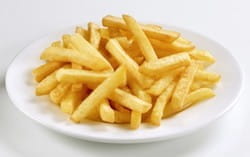Hippocrates said ‘ Let food be thy medicine’.
He wasn’t talking of a burger. But rather, organic, fresh, locally sourced, seasonal ingredients.
Lets take a look at a few foods that are good for us.
Broccoli
The “King” of health vegetables. Loaded with vitamins such as
B-6,A, folic acid, and K also full of minerals like potassium
and calcium. Broccoli, along with cauliflower and cabbage, also has unique cancer-fighting properties, activated by phytochemicals indole-3-carbinol and sulforaphane.
Flaxseeds
Combine the warm nutty flavor of flaxseeds with omega-3 fatty acids and you have a health food superstar.
Sprinkle them on cereal in the morning and enjoy the healthy
benefits they provide including:
* Lowering total cholesterol and LDL cholesterol levels.
* May also help lower blood triglyceride and blood pressure.
* Keep platelets from becoming sticky therefore reducing the risk
of a heart attack.
Green Tea
Many studies support the benefits of adding green tea to your diet.
Some studies show it has cancer risk reducing properties, and a
potential in also decreasing incidence of stroke and heart disease.
Make it habit to switch from regular black tea to green tea.
Walnuts
Walnuts are rich in heart-healthy omega-3 fatty acids, walnuts are
the first food that the FDA allowed to make this claim
“Supportive but not conclusive research shows that
eating 1.5 oz of walnuts per day, as part of a low saturated fat
and low cholesterol diet, and not resulting in increased caloric
intake may reduce the risk of coronary heart disease.”
Salmon
Salmon is another healthy food superstar because it is low in
calories, saturated fat, and is also rich in omega-3 fatty acids
and protein. Research studies have shown anti-inflammatory and
cancer prevention properties and a key role in diabetes and
Alzheimer’s prevention plus cardiovascular benefits.
Blueberries
If you are looking for an antioxidant punch look no further
then the blueberry. This fruit has the highest level of antioxidants
among fruits. Studies have shown that blueberries can help in
lowering cholesterol, reducing diabetes risk, and even slowing down
the aging process. Combine that with improving motor skills and
urinary and vision health and you have another
top 10 pick.
Spices
Turmeric has anti-inflammatory properties and may reduce cancer
risk and slow the progression of Alzheimer’s. Studies have shown
that cinnamon can help lower cholesterol and also stabilize blood
sugar. Ginger looks promising for cancer prevention and is
anti-inflammatory.
Pomegranate
Research on pomegranate has shown amazing health benefits including
reducing heart disease risk, lowering cholesterol and blood
pressure, and reducing the risk of certain types of cancer.
Dark Chocolate
Believe it or not dark chocolate actually makes our top 10 list
because of recent studies which show benefits to our cardiovascular
system as well as cancer-protective properties and mood-enhancing
benefits. Just remember to consume in moderation.
Be Healthy!



 Protein is an essential macronutrient. We can’t make it. We need to consume protein to stay healthy, fit, happy, and long-lived. But we need to consume the right amount at the right times.
Protein is an essential macronutrient. We can’t make it. We need to consume protein to stay healthy, fit, happy, and long-lived. But we need to consume the right amount at the right times.